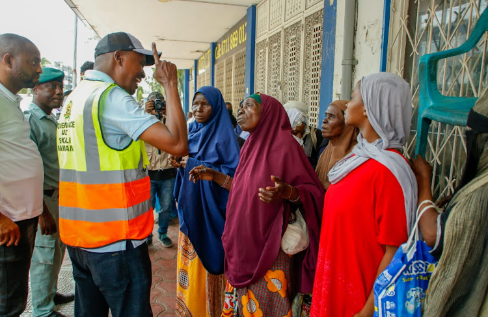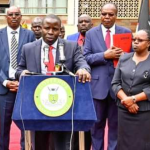On Saturday, Mombasa County inspectorate officers confronted the harsh reality of the harassment that residents face from street boys. The officers, led by governance and Serikali Mtaani chief officer Abdalla Daleno, embarked on a mission to clear the streets after receiving numerous reports of trouble. They started their operation from the inspectorate department in Tudor, Mvita constituency.
Their first stop at Haile Selasie Avenue revealed the severity of the problem. They witnessed a street boy physically assaulting a woman, groping her and covering her mouth to prevent her from screaming. This incident highlighted the daily struggles residents endure in Mombasa’s central business district.
The street boys operate in gang-like formations, attacking and robbing people under the direction of their leaders. These leaders, strategically placed, monitor the attacks and ensure that no gang ventures into another’s territory. After committing robberies, the gangs convene at specific meeting points to account for their loot, but this only happens when the gang leader is present.
The gangs function like close-knit families, offering protection to one another, though internal conflicts are common. When a member falls ill, they forcibly commandeer a tuk-tuk to transport them to Coast General Teaching and Referral Hospital, where they also engage in harassment.
Romantic relationships also flourish within these gangs, with the leader having the privilege to choose a partner before others can pursue relationships with females on the streets.
“This is unacceptable. We cannot live like we are in a gangster state,” Daleno stated after overseeing the arrest of at least 50 street boys. Most of those arrested claimed to come from Tanzania and Burundi.
Daleno confirmed that the county’s initiative to remove all street urchins from Mombasa’s streets began in earnest on Saturday and will continue until the streets are clear of them.
“We want to ensure Mombasa is safe. We have received numerous reports of these street boys attacking and robbing people,” Daleno said. He added that the county plans to work with the national government to find solutions for rehabilitating and repatriating them.
“For those who are willing to be rehabilitated, we will provide support and, once successful, find them income-generating opportunities,” Daleno explained. He expressed concern over the presence of many foreigners among the street boys, suspecting that it might indicate a business venture behind their presence.
He recalled a BBC Eye Africa investigation into street families in Nairobi, which revealed a multi-million shilling operation involving trafficking children and adults from Tanzania into Kenya to beg for money. According to the documentary, these individuals were dropped off at strategic begging points by vehicles in the morning and picked up in the evening.
Each beggar reportedly earned between Sh1,000 and Sh3,000 daily, while the ‘owner’ collected the money and paid them between Sh100 and Sh200.
“This might be the same kind of operation now in Mombasa,” Daleno suggested. He noted that a special team is collaborating with the National Police Service to investigate further.
Daleno also pointed out that the street boys have begun to cause disturbances at public cemeteries, where they scare passers-by and deter residents from visiting graves. “This exercise will be ongoing and will continue until we have removed all beggars and street families from Mombasa,” Daleno stated.
He identified popular spots for street families, including behind Sapphire Hotel near Mombasa Railway Station, Makadara grounds, and the area near Splendid matatu stage. “We don’t know where they come from, and the arrested individuals are reluctant to speak. It appears they may have been threatened into silence,” he said.
Daleno assured that efforts would be made to trace their families and determine their origins, with deportation being considered if necessary.



